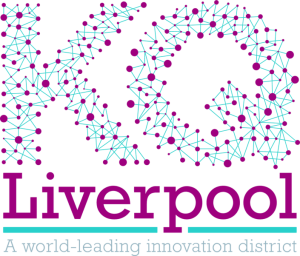Key landmark demolished as innovation scheme enters new phase
Liverpool’s flagship £1bn Knowledge Quarter development is set to enter a new phase – following the completion of the demolition of a key landmark.
Removal of the former Smithdown Lane Police Station at the Paddington Village South scheme has now completed, paving the way for new development opportunities under a masterplan being co-ordinated by Liverpool City Council and the University of Liverpool.
Paddington South, which is backed by MHCLG funding, is the next instalment of the *multi award-winning Paddington Village development.
This site currently includes the WELL Platinum standard rated Spine Building, which provides Grade A office space, a multi-storey car park, and the Novotel Liverpool Paddington Village Hotel.
The ambition for the Paddington South masterplan will be to super charge the city’s research, development and innovation sector, whilst creating a vibrant new neighbourhood for the area, embedded in sustainable development principles.
Central to the 9-acre scheme will be a revamped public green space around Grove Street, with the aim of improving biodiversity by 10% as part of the city’s wider urban green up programme and, new active travel routes linked to the wider City cycle network.
The new green space will be aligned with the Liverpool Public Realm, and Design for Access for All Strategic Planning Documents with the aim of achieving zero carbon in operation, aligning with the Council’s 2030 net zero ambitions and assisting the University in its 2035 net zero campus aim.
Through the demolition of Smithdown Lane Police Station, lead contractor Morgan Sindall Construction has aimed to recycle and reuse as much of the existing materials as possible. Working in partnership with local charity ReciproCity, existing furniture from the building was recycled and donated to local charities and businesses, which avoided in excess of 250 office desks and chairs along with other furniture from going to landfill.
Morgan Sindall has previously delivered an infrastructure package of works, The Spine, The Novotel and the MSCP on the Paddington Village Central site. This, combined with the ongoing works at Paddington South has so far delivered £122.5m of social value for Liverpool, including engaging with 3,534 students, employing 123 Apprentices over 1,623 apprentice weeks and engaging over 150 people through our Knowledge Quad employment courses.
- The City Council owned Paddington Village site has earned numerous industry awards including eight Considerate Construction Awards including “Most Considerate Site”, an Innovation Award from the BCO for The Spine and three Constructing Excellence North West Awards for The Spine.
Minister for Local Growth, Alex Norris, MP, said:
“The Paddington South site is set to become a hub for research and innovation, driving growth and opportunities in Liverpool’s Knowledge Quarter and beyond, helping us deliver on our Plan for Change.
“Liverpool has always been at the forefront with new ideas and innovation so it’s exciting that the project has entered this new phase, and I look forward to seeing it progress in the months ahead.”
Councillor Liam Robinson, Leader of Liverpool City Council, said:
“The clearance of the old police station at Paddington South is a landmark moment in our journey to ensuring Liverpool becomes one of Europe’s leading R&D centres in science innovation.
“An expanded Paddington Village is vital to the city’s future economic growth and to creating a conveyor belt of high skilled jobs. Once delivered, this former brownfield site will become the engine room for the delivery of our wider Investment Zone plans for the coming decade and beyond.
“I’m delighted the focus on providing a world-class development is as much on sustainability and creating a new green lung in the city and look forward to seeing the masterplan for the site take shape and develop.”
Professor Tim Jones, Vice Chancellor at the University of Liverpool, said:
“We are excited about this latest milestone in the development of Paddington South. This site provides us with an exciting opportunity to realise a step-change in our research and development activities in areas where we are already rated as world-leading.
“We are particularly passionate about the important benefits the development will have for our city in terms of jobs, reputation, wealth generation and more.”
Colin Sinclair, CEO at Knowledge Quarter Liverpool, said:
“Paddington Village is intrinsic to the future success of the KQ Liverpool innovation district, with the capability to help create upwards of 10,000 new, highly-skilled jobs in the city region, building on our existing strengths in life sciences, robotics engineering and materials chemistry.
“The provision of green space and other amenities is crucial in creating a genuine sense of place and attracting people to live and work here. We look forward to supporting Morgan Sindall and the city council in their efforts to complete this next phase of work – taking us a step closer to realising the enormous potential of Paddington Village.”
Steven Gregory, North West Area Director at Morgan Sindall, said:
“The completion of this demolition marks a key milestone not just in the transformation of Paddington Village South, but in Liverpool’s wider ambition to become a powerhouse for innovation.
“As in our previous work at the Knowledge Quarter, we’ve taken a sustainability-first approach – maximising reuse and recycling throughout the process, and working with fantastic partners like ReciproCity to ensure surplus furniture went to local charities instead of landfill. This project is about building for the future – creating opportunities, driving social value, and leaving a legacy that benefits the community for generations to come.”

